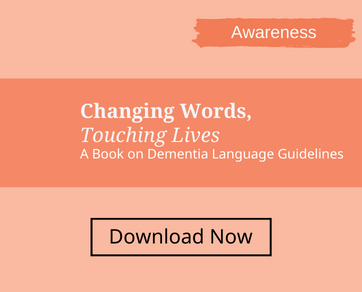Forgetfulness is not the only warning sign of dementia. Instead, it might be a result of normal ageing and not dementia. Learn how dementia is different from normal ageing.
As we age, some of us may get more forgetful and require a bit more time to recall things, or even struggle to multitask. It can get a little worrying that these might be early signs of dementia. However, these can be a result of normal ageing and not dementia.
The table below compares the 9 differences between signs of normal ageing and symptoms of dementia.
Age-related Changes | Dementia |
Problems with memory | |
Occasionally forgetting names or appointments and events, but being able to remember them later. Sometimes, completely forgetting what others have mentioned. | May have trouble remembering people or important dates and events, and/or ask for the same information over and over again to the point that this can affect their daily activities (e.g., getting around and making purchases). |
Misplacing items | |
Occasionally misplacing items, but being able to retrace steps to find them. | Losing items and being unable to retrace steps to find them. Placing things in unusual places (e.g., placing a mobile phone in the refrigerator), and/or accusing others of stealing. These behaviours might occur more frequently over time. |
Problems with visual perception | |
Age-related vision changes, such as cataracts or glaucoma, can result in poor vision. | Becoming unable to recognise objects and faces due to changes in the brain. Difficulty in identifying patterns, colours, distances and spaces (e.g., perceiving glare on the floor as a pool of water). |
Problems with walking & mobility | |
Due to age-related health reasons, such as muscle weakness and joint problems, may experience pain and stiffness when walking, or have reduced tolerance to walk long distances or climb the stairs. | Gradually losing the ability to walk safely due to reduced balance and awareness of the environment. May require more support to sit, stand and move over time. |
Changes in mood, behaviour & personality | |
Getting tired of work, family and social activities sometimes, and feeling a little down or anxious. Occasionally becoming irritable when familiar routines or specific ways of doing things are disrupted. | Having rapid mood swings for no apparent reason, withdrawing from social activities, becoming passive, and sleeping more than usual. Becoming a little insensitive towards others. |
Confusion with time & places | |
Occasionally getting confused about the day of the week but able to figure it out later. Sometimes, going to a spot in the house and forgetting the reason of going there, but able to remember the reason again. | Being unable to tell the time, or experiencing confusion about meal times (e.g., asking for lunch at night). Being unable to recognise their location, even their own home, which leads to feelings of frustration in unfamiliar or noisy environments. Getting lost in familiar places they often go to. |
Difficulties in communication | |
Experiencing a bit of difficulty finding the right word sometimes. Needing to concentrate harder to keep up with a conversation, but sometimes losing track of the conversation if distracted or if multiple people speak at the same time. | Struggling to express themselves, and having trouble finding the right word or naming objects. Having problems understanding what others are saying, and sometimes stopping conversations without knowing how to continue. |
Judgement & social behaviour | |
Making a bad decision once in a while. | Not knowing if it is safe or correct to do certain things (e.g., giving large amounts of money to strangers, or shouting and taking off clothes in public). |
Difficulties in planning, thinking & completing familiar tasks | |
Being a bit slower to react to things or think things through, and becoming less able to multitask, especially when distracted. Occasionally making a mistake, e.g. when planning the monthly household budget. | Having difficulty planning and carrying out familiar and daily tasks (e.g., organising a grocery list, managing the monthly household budget and paying bills, or remembering the rules of a favourite game). Paying less attention to grooming or hygiene. Having trouble concentrating and following instructions, and because of this, taking a much longer time to do things. |
Content in table is adapted from Alzheimer’s Association and Alzheimer’s Society.
DO NOT: Use the above list to self-diagnose or diagnose someone with dementia.
DO: If you or someone you know is experiencing symptoms of dementia, consult a family doctor or polyclinic doctor who can guide a person through the process of tests and diagnosis.
Tell us how we can improve?
Read Next
- Alzheimer Society of Calgary. (n.d.). Young-Onset Dementia. Retrieved 5 March, 2020, from https://www.alzheimercalgary.ca/learn/types-of-dementia/young-onset-dementia


